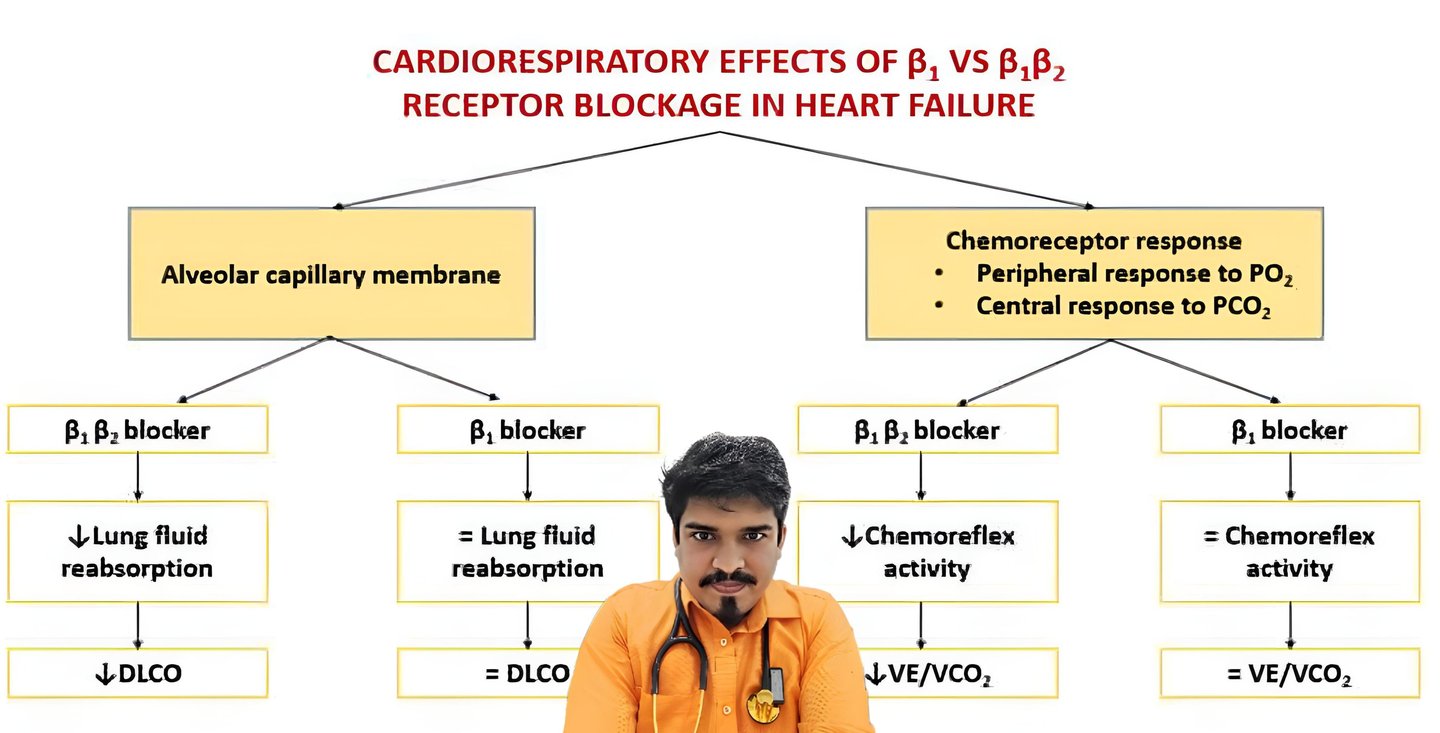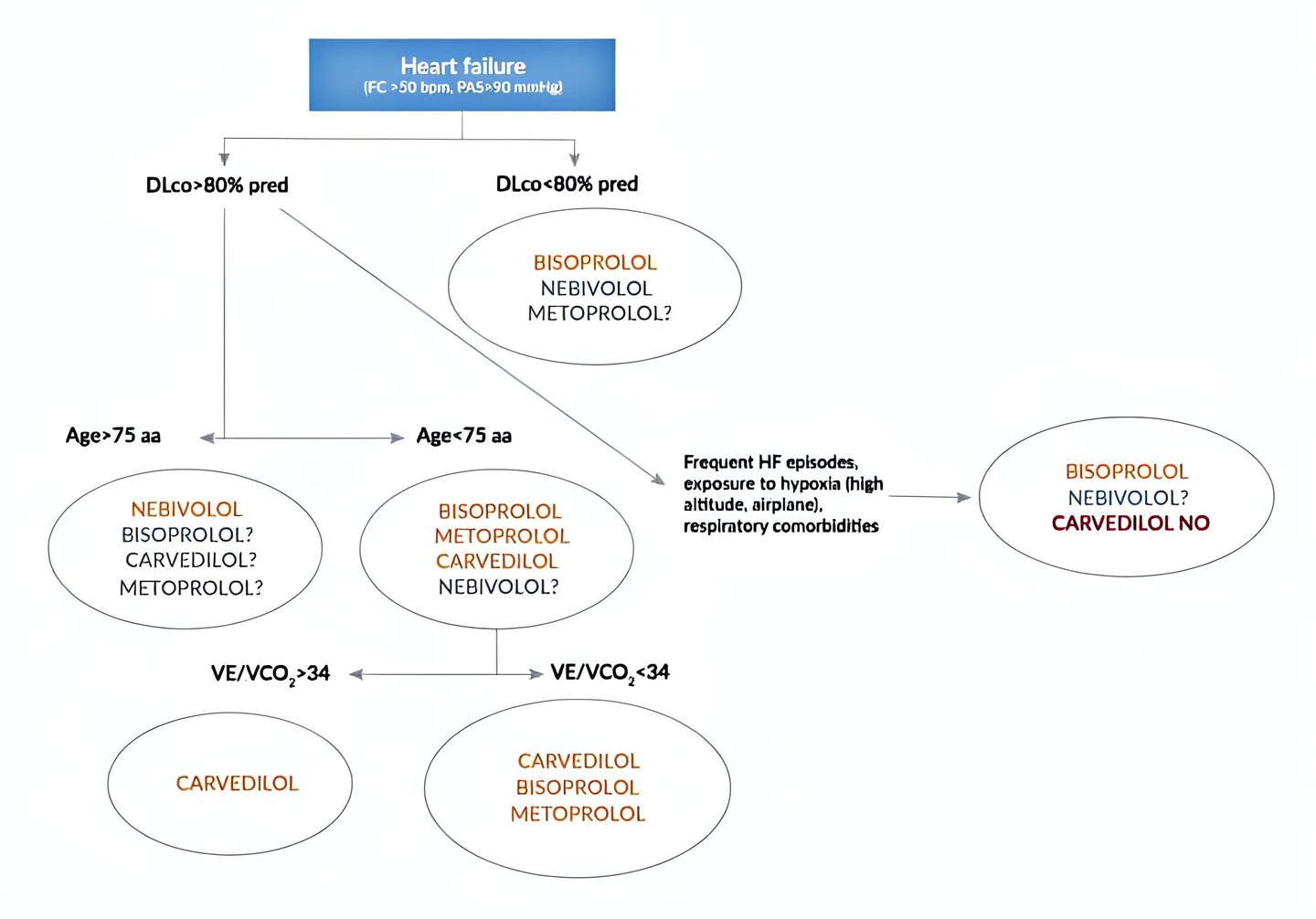Dr V. W. Verlekar
Managing Heart Failure with Selective Beta-Blockers in Patients with Respiratory Comorbidities
𝗔𝗹𝗴𝗼𝗿𝗶𝘁𝗵𝗺 𝘁𝗼 𝗰𝗵𝗼𝗼𝘀𝗲 𝗼𝗽𝘁𝗶𝗺𝗮𝗹 β-𝗕𝗹𝗼𝗰𝗸𝗲𝗿 𝗶𝗻 𝗽𝗮𝘁𝗶𝗲𝗻𝘁𝘀 𝘄𝗶𝘁𝗵 𝗛𝗲𝗮𝗿𝘁 𝗙𝗮𝗶𝗹𝘂𝗿𝗲
CARDIO-PULMONOLOGY
Dr V. W. Verlekar
4/11/20243 min read


Introduction
Beta-blockers are a commonly used medication for the treatment of heart failure (HF). They have been proven to be effective in improving clinical outcomes for HF patients. However, there is a subset of HF patients with compromised respiratory physiology, such as those with chronic obstructive pulmonary disease (COPD) or restrictive lung disease, who may require a different approach when it comes to choosing the appropriate beta-blocker. In this article, we will explore the selectivity of beta-blockers in patients with respiratory comorbidities and how they can be safely used to manage HF.
Beta-Blockers and Heart Failure
Beta-blockers are a class of medications that work by blocking the effects of adrenaline on the heart. By doing so, they reduce the workload on the heart and improve its efficiency. This makes beta-blockers an important part of the treatment for HF, as they help to alleviate symptoms, improve exercise tolerance, and reduce the risk of hospitalization and mortality.
Considerations for HF Patients with Respiratory Comorbidities
While beta-blockers are generally recommended for HF patients, those with respiratory comorbidities require special consideration. Conditions such as COPD and restrictive lung disease can cause airway obstruction and decrease lung function. Traditional non-selective beta-blockers, which block both beta-1 and beta-2 receptors, may exacerbate these respiratory symptoms and lead to bronchoconstriction.
Selective Beta-Blockers for HF Patients with Respiratory Comorbidities
To address the concerns of respiratory comorbidities in HF patients, selective beta-blockers can be used. Selective beta-blockers primarily block the beta-1 receptors in the heart, while having minimal effect on the beta-2 receptors in the lungs. This selectivity reduces the risk of bronchoconstriction and allows for safer use in patients with compromised respiratory physiology. One example of a selective beta-blocker is bisoprolol. Bisoprolol is a beta-1 selective blocker that has been shown to be effective in improving outcomes in HF patients. It has a lower risk of bronchoconstriction compared to non-selective beta-blockers, making it a suitable choice for HF patients with respiratory comorbidities. Another option is nebivolol, which not only has beta-1 selectivity but also has vasodilatory properties. This can be beneficial for HF patients with concomitant hypertension or vascular disease. Nebivolol has been shown to improve exercise capacity and quality of life in HF patients, while also being well-tolerated in those with respiratory comorbidities.
Benefits of Selective Beta-Blockers in HF Patients with Respiratory Comorbidities
The use of selective beta-blockers in HF patients with respiratory comorbidities offers several benefits. Firstly, it allows for the effective treatment of HF while minimizing the risk of exacerbating respiratory symptoms. This is important as respiratory comorbidities can significantly impact the quality of life for these patients. Secondly, selective beta-blockers have been shown to improve outcomes in HF patients with respiratory comorbidities. Studies have demonstrated that the use of selective beta-blockers, such as bisoprolol and nebivolol, can reduce hospitalizations, improve exercise capacity, and decrease mortality rates in this patient population. Lastly, the use of selective beta-blockers provides an opportunity to optimize the management of both HF and respiratory comorbidities. By effectively treating HF, these medications can help to alleviate symptoms and improve overall cardiac function. At the same time, they can be used safely in patients with compromised respiratory physiology, allowing for a comprehensive approach to their healthcare.
Conclusion
In conclusion, the selectivity of beta-blockers is an important consideration when treating HF patients with respiratory comorbidities. Selective beta-blockers, such as bisoprolol and nebivolol, offer a safe and effective option for managing HF in these patients. By minimizing the risk of bronchoconstriction and optimizing cardiac function, selective beta-blockers can improve outcomes and quality of life for HF patients with compromised respiratory physiology. It is important for healthcare providers to recognize the unique needs of this patient population and consider the use of selective beta-blockers as part of their treatment plan.









